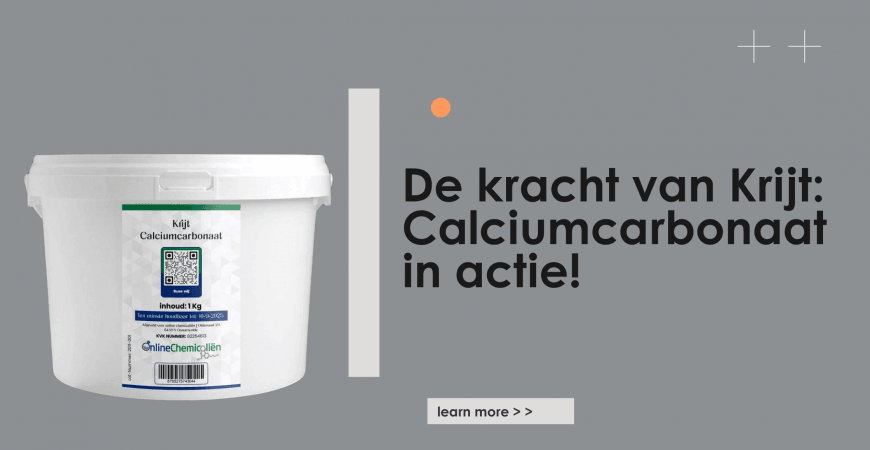
Onderschat de kracht van krijt niet: de veelzijdige toepassingen van calciumcarbonaat
Onderschat de Kracht van Krijt Niet: De Veelzijdige Toepassingen van Calciumcarbonaat
Krijt. Misschien roept het beelden op van schooltijd en stoffige speelplaatsen, maar deze nederige substantie, ook bekend als calciumcarbonaat (CaCO₃), verrast ons met zijn veelzijdigheid! Calciumcarbonaat is een uiterst veelzijdig mineraal met een breed scala aan toepassingen in verschillende sectoren.
Meer dan Alleen Schoolborden: Industriële Toepassingen
Een Stevigere Basis BouwenCalciumcarbonaat dient als vulmiddel in diverse industriële producten zoals verf, plastic, en rubber. Het verhoogt de sterkte, duurzaamheid en het volume zonder afbreuk te doen aan de kwaliteit, en is daardoor een essentieel onderdeel in deze industrieën.
Perfect Papier
De papierindustrie is afhankelijk van calciumcarbonaat om een glad en ondoorzichtig oppervlak te creëren, wat de bedrukbaarheid en leesbaarheid verbetert. Dit maakt het een essentieel onderdeel bij de productie van papier.
Vruchtbare Grond
In de landbouw functioneert calciumcarbonaat, vaak in de vorm van kalk, als meststof door de pH-waarde van de bodem te verhogen. Dit is gunstig voor gewassen die gedijen in licht alkalische omgevingen, zoals luzerne en klaver.
Van Keuken naar Canvas: Dagelijkse Toepassingen
Voeding voor de Geest
Calciumcarbonaat wordt vaak gebruikt in voedingsmiddelen als een natuurlijk anti-klontermiddel of zuurteregelaar, zoals in poedervormige producten zoals koffiemelk en bakpoeder.
Artistieke Uitspatting
Kunstenaars gebruiken krijt om te tekenen en verbluffende kunstwerken te creëren. De textuur maakt een soepele vermenging en schaduwwerking mogelijk, waardoor het een veelzijdig hulpmiddel is voor artistieke expressie.
Schoonmaakheld
De milde schuurkracht van calciumcarbonaat maakt het een waardevol ingrediënt in schoonmaakmiddelen. Het verwijdert vuil en aanslag zonder oppervlakken te beschadigen, ideaal voor delicate oppervlakken zoals marmer of porselein.
Een Natuurlijke Keuze voor Dierenwelzijn
Calciumcarbonaat is een belangrijke bron van calcium in diervoeding, essentieel voor gezonde botten en het algehele welzijn van dieren. Het wordt vaak toegevoegd als supplement in voer, met name voor pluimvee en vee. Dit noemen ze ook wel voederkrijt.
Calciumcarbonaat: Een Duurzame Held
Als een van nature voorkomend mineraal is calciumcarbonaat een duurzame en milieuvriendelijke keuze voor veel toepassingen. De veelzijdigheid vermindert de behoefte aan andere materialen, wat de milieu-impact minimaliseert.
De Volgende Keer dat u Krijt Ziet...
Denk verder dan het klaslokaal! Calciumcarbonaat, een schijnbaar simpel mineraal, speelt een cruciale rol in verschillende aspecten van ons dagelijks leven. Van bouwmaterialen tot het voedsel op ons bord, de kracht van calciumcarbonaat is onmiskenbaar.
Op Zoek naar Hoogwaardige Calciumcarbonaat Producten?
Ontdek het brede scala aan calciumcarbonaat producten bij OnlineChemicaliën.nl! Wij bieden diverse kwaliteiten en hoeveelheden om aan uw specifieke behoeften te voldoen. Bezoek vandaag nog onze website: OnlineChemicaliën.nl
Veelgestelde Vragen (FAQ)
1. Wat is de gemiddelde doorlooptijd van een bestelling over de webshop?
- De gemiddelde doorlooptijd is 3-5 werkdagen, afhankelijk van beschikbaarheid en verzending.
2. Kan ik mijn bestelling wijzigen of annuleren?
- Ja, u kunt uw bestelling wijzigen of annuleren binnen 24 uur na plaatsing door contact op te nemen met onze klantenservice.
3. Bieden jullie gratis verzending aan?
- Wij bieden gratis verzending voor bestellingen boven de €50. Voor bestellingen onder dit bedrag wordt een verzendkostenvergoeding van €4,95 in rekening gebracht.
4. Hoe kan ik mijn bestelling volgen?
- Nadat uw bestelling is verzonden, ontvangt u een track & trace-code waarmee u de status van uw levering online kunt volgen.
5. Wat moet ik doen als ik een beschadigd product ontvang?
- Als u een beschadigd product ontvangt, neem dan onmiddellijk contact op met onze klantenservice voor vervanging of restitutie.
6. Welke betaalmethoden accepteren jullie?
- Wij accepteren iDEAL, creditcard, PayPal en bankoverschrijvingen als betaalmethoden.
Conclusie
Wij streven ernaar om u de best mogelijke service te bieden en hopen dat uw winkelervaring bij ons vlekkeloos en plezierig is. Heeft u verdere vragen of opmerkingen, aarzel dan niet om contact op te nemen met onze klantenservice. Wij staan altijd klaar om u te helpen. Bedankt voor uw vertrouwen in onze webshop!


